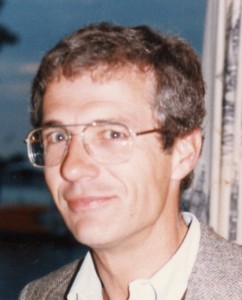Remembering A Friend and His Gentle Reminders
- Share
- Tweet
- Pin
- Share
My friend Bob Pohl died a few weeks ago. We shared a love of print. His background was in print advertising while mine was in working with an advertising agency. He came to the peninsula from the greater Chicago area, and I moved back to the peninsula from the city of Chicago.
If this had been all we had in common we still would have had enough to talk about during breaks from working together for more than a decade at the Door Reminder. But we shared one more thing in common: Bob was an alcoholic, and I am an alcoholic. When we met, Bob had been sober for many years. I, on the other hand, hadn’t been sober (other than relatively brief periods of time) for many years.
In the heyday of the Door Reminder, Bob seemed to know everyone in Door County from Sturgeon Bay north. And while not everyone knew that Bob was an alcoholic, he never made a secret of his alcoholism. I remember how this fact struck me. My father, who was also an alcoholic and was sober when my own alcoholism was at its worst, was another who never made a secret of his affliction. But I was struck more by Bob’s openness than that of my father: as is often the case, an outsider’s experience and behavior often impact us more than the same experiences and behaviors in our own family.
Despite this openness, Bob never really talked a great deal about the details of his alcoholism, but he did make occasional references in my presence. When I visited him at Door County Memorial Hospital where he was undergoing rehab following surgery to remove the tumor in his brain, he led me to a small room across the hall from his own room, and after making certain that no nurses were watching, he rose from his wheelchair and carefully shuffled across the room. Once I realized what he intended to do – demonstrating the progress he was making in his recovery – I quickly went to his side, but he waved off assistance.
After he had crossed the room, it became apparent that he would need some help in getting back to the wheelchair. I grabbed his elbow, and we walked slowly back. Before he sat back down Bob said, “You know, Stevie (Bob was one of the few people I allowed to use this name), 30 years ago or so this is what we might have looked like after coming home from the bars.”
This was typical of the way Bob referenced his past alcoholism, but it served another purpose in my own life: it reflected Bob’s way of reminding me that I am an alcoholic and that my sobriety is a vigil.
My initial work at the Door Reminder was writing stories on businesses for the annual Progress Edition. This special publication was one of Bob’s pet projects and could entail a considerable amount of writing. In 1992, Bob and the rest of the sales force outdid themselves. When the Progress Edition for that year was sent to the press it comprised three sections, totaling over 120 pages of material. And I was the lone writer. And I was drinking heavily.
Somehow we managed to get it done, but to say that I struggled through and complicated the entire process for everyone hardly describes the ordeal. And through the years, Bob would gently remind me of this ordeal, laughing as he recounted my condition and his concerns. Typically, he would close the subject with something like, “I thought for sure that I was going to have to run out and buy you some vodka just so your hands would stop shaking enough to be able to finish typing.” And I would respond with something like, “I have no doubt that if you believed it was necessary that’s what you would have done and then, after I finished, you would have called the ambulance.”
This type of exchange was just another example of Bob’s reminding me of my disease and, perhaps, reminding himself of his own alcoholism.
Ultimately, Bob – acting on a suggestion by Paul Burton – offered me the opportunity to begin writing a column for the Door Reminder. I was both intimidated and excited by the prospect and, after some discussion with my father, I accepted the position. I was sober at this point, and the routine and challenge of writing something new each week was a welcome focus. It took some time for me to find my stride as a columnist, but the Door Reminder – and Bob – gave me remarkable freedom in what I wrote. By his own admission, Bob seldom read my column before (or even after) it went to print but in his ceaseless sales calls around the county he would ask advertisers about my current column and then report their feelings to me.
He ran interference when I angered readers and – no doubt – took as much credit as he was able to when readers liked what I wrote. On very rare occasions he asked me to address a particular subject, and I always willingly complied – I owed him that courtesy.
But, other than efforts by my family members, what I owed Bob most – and still owe Bob – is my sobriety. Bob, with his understated support and belief in my abilities and with his often-unsubtle reminders of my alcoholic past, gave me back my self-confidence. In all my therapies through the years – both in-patient and out – no one ever talked about confidence. And to be honest, Bob never spoke of confidence either. He simply gave me the opportunities to find my self-confidence on my own.
While his accomplishments were many, Bob will always be the man who allowed me to regain my self-confidence and to become a non-practicing alcoholic – a term I coined to refer to myself in jest one day that Bob took a particular liking to. And though Bob is now gone, I will be thankful to have known him and will be hearing his gentle, usually humorous, reminders of my “practicing alcoholic” days in my head for the rest of my life.


